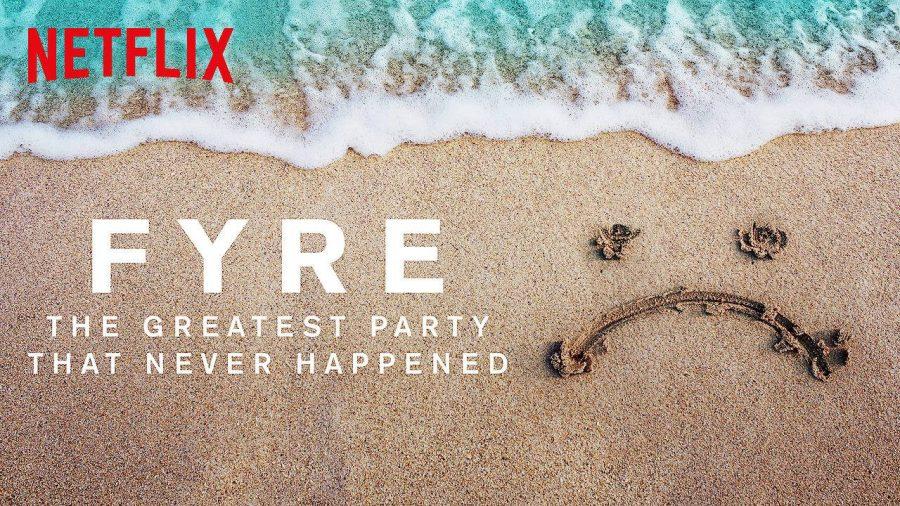Fyre Festival, the brainchild of practiced millennial manipulator Billy McFarland, was a 2017 ultra-luxe music festival in the Bahamas imagined to appeal to the basest desires of that much-maligned generation with celebrities, alcohol and scenic vistas; it was packaged and sold as the ideal opportunity for the young and well-to-do to capture enough social media content to adorn their feeds for a lifetime. The festival gained notoriety as attendees arrived at an island some have aptly described as reminiscent of “Lord of the Flies.”
On Jan. 18, Netflix was set to release its Fyre Festival documentary, “FYRE: The Greatest Party That Never Happened,” the first inside look at the music festival of the decade that went legendarily awry. In a surprising move, on Jan. 14, Hulu brashly moved up the release date of its dueling documentary, “Fyre Fraud,” to premiere immediately, four days before its Netflix counterpart. This was a proxy war for these longtime streaming rivals and it appeared Hulu was simply jockeying to be first to the story. However, after watching both, the early release is not only an attempt to be first to the buzzer on Fyre Festival but also to controvert the entire Netflix documentary. The Netflix documentary is but one in a series of misrepresentations that have occurred surrounding this now infamous festival.
The social media marketing for Fyre Festival was contracted to the advertising company FuckJerry. Their ingenious online campaign led to the kind of immediate and ubiquitous attention among millennials that was previously reserved for events like presidential assassinations and moon landings, but now, is garnered by music festivals, Kardashian child-births and pictures of eggs. It also led to a public image leading up to the festival of an island oasis, featuring no mention of the FEMA tents, wet mattresses and general chaos that festival goers would arrive to.
FuckJerry and its parent company Jerry Media, a company with a long history of dubious activity, were created by Elliot Tebele. In a conflict of interest so apparent that it’s staggering the production was allowed to continue, Jerry Media was a producer for Netflix’s “FYRE” and Elliot Tebele himself was credited as an executive producer on the film. This all went on despite his role as a partner to the festival since the beginning and the creation of a false image of luxury. Netflix essentially tasked the Titanic’s iceberg spotter with producing a documentary about its sinking.
The Hulu documentary is happy to point this out, although it does not name Netflix. The film interviews Oren Aks, the former FuckJerry employee who was tasked with constructing the Fyre Festival’s social media presence. The Hulu documentary and Aks go on to imply that FuckJerry was complicit in deceiving Fyre Festival attendees with the illusion that the physical Fyre Festival setup matched the vision of paradise propagated by the festival’s social media presence.
In the Netflix documentary, however, FuckJerry is another victim of McFarland. In Hulu’s accounting of the situation, FuckJerry, if not responsible for Fyre Festival’s failure, at least amplified the effects of the fallout. Jerry Media is now attempting to control the narrative and history of Fyre Festival through their involvement in the Netflix documentary. The company that misled the public about Fyre Festival at the outset is still misleading the public about Fyre Festival in the aftermath.
Hulu subtly skewers the Netflix documentary, but Hulu has its own scandal on its hands. The moral high ground the film occupies has been called into question, after it was revealed that McFarland was paid for his appearance in “Fyre Fraud.” McFarland was not involved with the production but compensating him for talking to the interviewers, aside from being journalistically unethical, also seems to rub salt in the wounds of the Bahamians and Fyre Festival attendees to whom McFarland caused significant financial harm.
There is a moral gripe to be had against McFarland being paid for participation, but ultimately it is valuable to hear the voice of the man behind the festival, and the Hulu film can be forgiven. The same cannot be said for the Netflix documentary, where Jerry Media’s participation in producing the film seems to violently veer the entire Fyre Festival narrative off course in a manner that substantially changes the history of the festival and the accounting of its organizers’ mistakes. In retrospect, the film looks more or less like a cover-up. With an internet that is rife with outrage at all but the most minor of transgressions, it is surprising that Netflix’s “FYRE” has escaped much of the vitriol. It has been remarkably well-received for an endeavor with such a grand lapse of integrity.
It should be pointed out that both documentaries are wildly entertaining; the events portrayed are almost unbelievably cartoonish, appallingly representative of the pitfalls of modern internet culture and it all plays out with some characters so pathologically disconnected with reality that the viewer is left aghast. Billy McFarland and Jerry Media, the man largely responsible for the Fyre Festival disaster and the co-conspirator company that put the finishing touches on the scam, both turned around and profited off of their mistakes with these films. This is a fitting ending to the Fyre Festival story. Whether it is told by Netflix, Jerry Media, Hulu or Billy McFarland himself, the Fyre Festival story warns of the distorted reality and widespread employment of contrived notoriety that is native to so much of the internet’s content, and finally, of how far some are willing to go to achieve this fame and manipulate our desire for it.
A version of this article appeared in the Monday, Feb. 11, 2019, print edition. Email Dante Sacco at [email protected].























































































































































